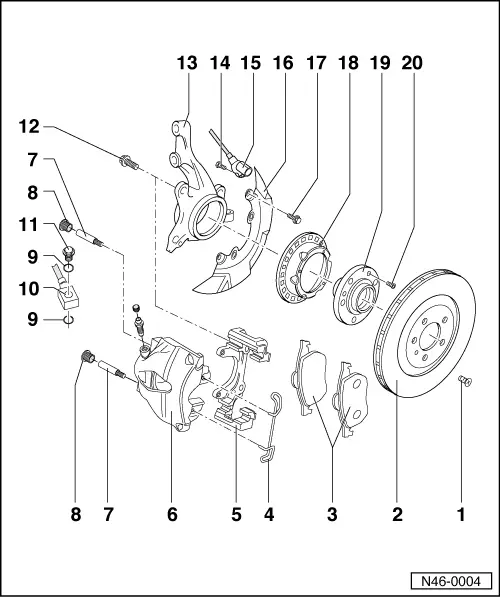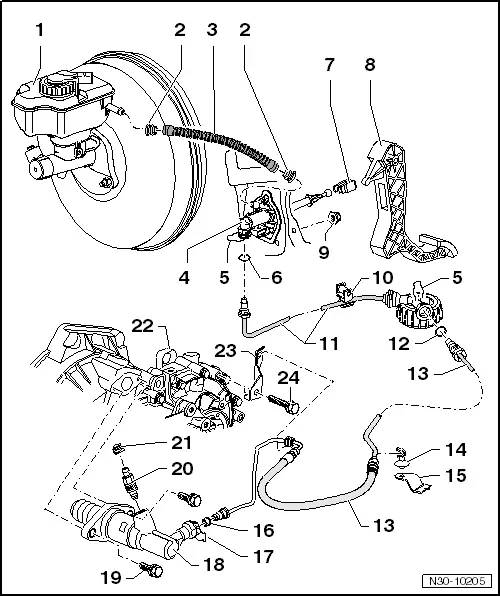
Full Answer
Why does my Volkswagen shake when I brake?
If the rotor becomes warped from excessive heat or unequal pressure from either side, the vehicle will shake. Shaking could also indicate it's time to replace your brake pads. Depending on your driving habits and conditions, one of the brake pads could wear down differently than the other.
What does it mean if my steering wheel shakes while braking?
If your steering wheel shakes a lot while you're braking, that could mean that your rotors are out of round. In other words, the rotors have started to wear out, lose their shape, and become warped.
What causes shaking in a car when braking?
Why a Car Shakes When Braking. In a vehicle with disc brakes, the most likely cause of shaking is a warped or otherwise damaged rotor. Warping can be a consequence of normal wear. The repeated application of the brake pad onto the rotor will wear away the rotor material in that contact area.
Why does my steering wheel shake when I brake UK?
If you notice your steering wheel tends to vibrate as you're slowing or stopping the car, it could mean there's an issue with your brakes. Your brake discs may have started to wear out and lose their shape, which means the brake pads are pressing against an uneven surface, causing the shaking.
How do I stop my car shaking when I brake?
An auto mechanic may be able to adjust, shim or resurface the rotors to compensate for the unevenness, but replacing them is a surer bet, and a relatively easy DIY job for those comfortable under the hood, too. And, some mechanics recommend that you always replace rotors and brake pads at the same time.
Can Bad inner tie rod cause vibration when braking?
When your tie rods go bad, the symptom you're most likely to experience first is a vibration or shaking sensation in your steering wheel. You may also hear associated clunking and rattling noises, especially when turning the vehicle at low speeds.
Why do brakes shake when stopping?
As the brake pads move over a thinner or thicker area of the rotor when stopping, the brake pedal will move up and down and the steering wheel will shake. As your brake pads press into a rough, rusted area of the rotor, braking and steering will be rough as well.
Why do disc brakes kink?
Dry, corroded, defective, missing brake caliper mounting hardware — especially caliper guide pins that do not permit the caliper to slide smoothly — will cause the brake caliper to bind and kink, meaning they can’t push the pads squarely against the rotor when applying the brakes.
Why do disc brakes come to a stop?
The energy of the pads pushing against the rotor generates heat from friction . This heat-friction slows the rotor (and wheel) rotation and ultimately makes the car come to a stop. Because the disc brake rotors are mechanically coupled to the wheels and suspension system, any vibrations during braking travel up the steering wheel, ...
What happens when you step on a brake pedal?
As the fluid acts on the caliper, the brake pads sitting inside the calipers squeeze the disc brake pads, clamping them down onto the disc brake rotors. The energy of the pads pushing against the rotor generates heat from friction.
Why are my rotors warping?
Overheated brake pads, as well as overtightened lug nuts, are the main reasons for warped rotors. Lack of use, or the environment where you live (salt air and road salts), can cause rotors to rust and corrode. Have a technician do a visual inspection and measure run-out.
What does it mean when your brakes are warped?
A warped disc rotor means the face of the rotor is not a uniform thickness. As the brake pads move over a thinner or thicker area of the rotor when stopping, ...
Why does my rotor wobble?
Rotor wobble is due to rust or grit buildup between a rotor and its mounting surface causing the rotor to wobble. Even minor rotor defects or cracks will cause shuddering while braking. Serious rotor failures can cause the wheels to lock up and you to lose control of your vehicle.
